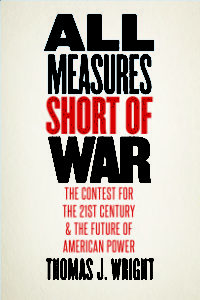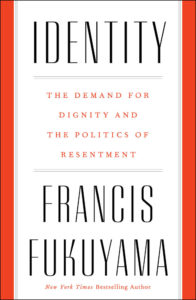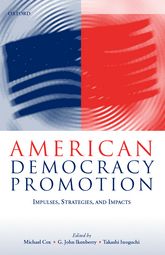The world is seeing the rise of a neo-authoritarianism that seeks to roll back freedom where it currently resides and advance its own global reach. It is not monolithic and contains internal contradictions, but this authoritarian trend packs enough of a punch to qualify as a coherent alternative to a free and open society, says Thomas Wright (above), Director of the Center for the U.S. and Europe and a Senior Fellow in the Project in International Order and Strategy at the Brookings Institution.
Clash of social models
There is a significant geopolitical dimension to the competition: China and Russia really do seek a sphere of influence in their respective regions and such ambitions are dangerous and destabilizing, he writes in The Free-World Strategy Progressives Need:
But the competition is rooted in a clash of social models — a free world and a neo-authoritarian world — that directly affects how people live. This clash has spilled over into western societies and directly challenges the democratic way of life. ….The clash of free societies and neo-authoritarianism shapes almost everything else. It makes multilateral cooperation much more difficult. It makes military interventions much more costly. It makes the global economy more volatile. It damages democracy and tolerance while empowering kleptocrats and xenophobia.
The United States should compete with authoritarian states to preserve and strengthen an international system that protects freedom and liberty by moving away from universal concepts of international order and toward a free world model whereby America seeks to bolster democratic societies, to inoculate them against illiberal forces at home and abroad, and to deter revisionist powers, adds Wright, the author of All Measures Short of War: The Contest for the 21st Century and the Future of American Power. The key elements of such a strategy would include  the following:
the following:
- The United States should focus on the threats posed by neo-authoritarianism to Western societies, including through political interference, attacks on the media, pressure on the private sector, cyber-attacks, and the challenges posed by technological innovations, such as AI, 5G, and Quantum. This would require a national conversation and mobilization to effectively compete.
- The challenge of neo-authoritarianism is of greater strategic importance than the Middle East or counter-terrorism operations and should therefore be reflected in budgets, personnel, and the time dedicated to addressing this problem. It also means withdrawing forces from Afghanistan and ending support for the war in Yemen.
- Deter revisionist powers from creating a spheres of influence order in Europe and Asia and ensuring that America’s democratic allies can participate and prosper in a free and open international order, including in their regions.
- The United States must transform its alliances so they can address these authoritarian threats to free societies. Currently U.S. alliances are completely ill-equipped to do so. America should consider a global alliance structure dedicated to addressing the threat and to creating new rules and institutions that reflect U.S. values.
- The United States must be more willing to use power and leverage in pursuit of its strategic goals than the Obama administration was. This includes getting much tougher on authoritarian allies — such as Hungary and Turkey — who are drifting toward the neo-authoritarian camp.
Identity and Belonging
It is surprising to see how many so-called progressive national security strategies pass over the challenges to America’s democracy, notes Heather Hurlburt, who runs the New Models of Policy Change Initiative at New America.
As many commentators on the future of democracy have noted, one of the key battles at the moment is over identity and belonging, she writes in Back to Basics: The Core Goals a “Progressive” Foreign Policy Must Address, a contribution to a Texas National Security Review symposium on The Future of Progressive Foreign Policy (alongside parallel symposia on The Future of Conservative Foreign Policy and Disentangling Grand Strategy):
The United States and other democratic societies are becoming internally divided in ways that spill into foreign affairs, repudiating notions of the state as a unified, monolithic entity. Cities are conducting foreign policy and are taking the lead in responding to progressive priorities like climate change. But right-wing populists, authoritarians, and even white nationalists have built effective international cooperation — with profound consequences.
Progressive foreign policy should be aimed at achieving core progressive goals for society, Hurlburt argues: improving economic justice and social cohesion, defending democratic institutions and norms, and fostering a patriotism in which diverse identities belong and flourish.
 Like other foreign policy doctrines, progressive internationalism is grounded in a set of moral principles, according to Adam Mount, Senior Fellow and Director of the Defense Posture Project at the Federation of American Scientists:
Like other foreign policy doctrines, progressive internationalism is grounded in a set of moral principles, according to Adam Mount, Senior Fellow and Director of the Defense Posture Project at the Federation of American Scientists:
Progressive internationalists believe that the United States must represent a force for good in the world — not just good as Americans see it, but a kind of good that any reasonable society could accept for itself. Progressives grasp intuitively that global perceptions of U.S. actions are important to both their success and their moral acceptability. In practice, these principles oblige American foreign policy not only to support the capabilities of American citizens to lead lives that are healthy, fulfilling, and free, but to also do the same for foreign citizens.
The best recent progressive foreign policy proposals are directly motivated by these principles, including a global democratic movement to confront the ascendant nexus of transnational neofascism, authoritarianism, kleptocracy, and corruption, Mount writes in Principles for a Progressive Defense Policy. It is not only a moral imperative but also the most effective means of securing America’s interests: Just as democracy, health, controlling inequality, and sustainability are important to a healthy polity, they are similarly important to creating a stable and peaceful world in which that polity can exist.







